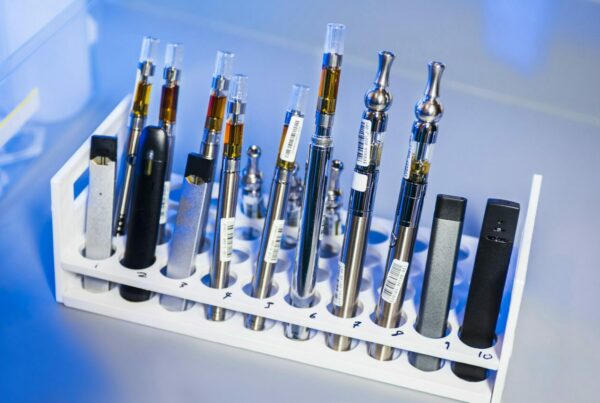N, N-Dimethyltryptamine (DMT) is a compound commonly found in both flora and fauna, and it’s known for its potent yet short-lived psychedelic effects when ingested.
There is a growing body of evidence suggesting that DMT, which naturally occurs in the body, plays important roles in both the peripheral and central nervous systems, potentially serving as a neurotransmitter.
DMT can produce strong psychedelic effects, but it typically doesn’t result in many negative effects, apart from potential cardiovascular problems when administered in high doses via injection.
Let’s take a closer look at DMT and its various roles, ranging from recreational use to its potential in scientific research and therapeutic applications.

DMT: A Brief Overview
| Aspect | Description |
| Name | N, N-Dimethyltryptamine (DMT) |
| Classification | Indole alkaloid |
| Occurrence | Occurs naturally in a variety of plants and animals |
| Psychoactive Effects | Induces brief, intense psychedelic experiences when ingested. |
| Method of Consumption | Can be smoked, injected, or consumed orally. |
| Duration of Effects | Effects are short-lived, typically lasting between 5 to 30 minutes. |
| Chemical Structure | Comprises a tryptamine core with two methyl groups attached to the amine nitrogen atom. |
| Metabolism | Rapidly metabolized by the body, broken down by monoamine oxidase (MAO). |
| Cultural Use | Historically used in various ceremonial and shamanic rituals by indigenous cultures. |
| Other names | Dimitrifantasia, businessman’s trip, Businessman’s special, 45-minute psychosis, spiritual molecule |
The Role of DMT in Mental Health
N, N-Dimethyltryptamine (DMT), a compound famous for its powerful psychedelic effects, is garnering attention for its possible benefits to mental health. While it’s traditionally associated with inducing intense visionary experiences, recent research suggests a correlation between DMT and mental wellness.
Influence on Psychological and Emotional Well-being
DMT is renowned for its psychedelic effects that can spark deep emotional responses and transform consciousness. These characteristics could potentially pave the way for innovative therapeutic methods to address mental health issues, aid in emotional processing, and offer new perspectives on personal traumas.
Neuroplasticity and Brain Function
Research suggests DMT may influence neuroplasticity, enhancing the brain’s ability to adapt and reorganize. The study of its impact on synaptic plasticity and neural connectivity could provide possible treatment options for disorders related to neural misalignment.
Potential Therapeutic Use for Mental Health Disorders
Initial studies underscore the potential of DMT in treating disorders such as depression, addiction, and PTSD. Its ability to induce mystical or spiritual experiences could offer a novel approach to psychotherapy and aid in restructuring negative thought processes.
An examination of the natural presence of DMT within the body underscores its significance in promoting mental health resilience, managing stress responses, and maintaining overall psychological well-being. Understanding how the body controls internal DMT levels may lay the foundation for novel therapeutic strategies.
DMT and Mental Health Disorders
| Mental Health Disorder | Description | DMT’s Efficacy | Advantages |
| Depression | Defined by a mood disorder that results in constant sadness, apathy, and reduced motivation | Preliminary research indicates that DMT might help alleviate symptoms by fostering intensely emotional experiences. | Its rapid onset and ability to provoke transformative experiences may provide innovative therapeutic techniques for reconfiguring negative thought patterns and enhancing emotional processing |
| Post-Traumatic Stress Disorder (PTSD) | A mental health condition triggered by traumatic events leading to flashbacks, intense anxiety, and intrusive thoughts | Early investigations suggest DMT’s potential in managing symptoms by inducing spiritual or mystical experiences that could help patients reshape traumatic memories | DMT’s potential to induce altered states of consciousness could facilitate emotional processing and provide a fresh perspective on traumatic experiences |
| Addiction | A complex disorder characterized by compulsive engagement in rewarding stimuli, despite adverse consequences | Some research suggests DMT’s potential in disrupting addictive patterns and reducing substance cravings | The capacity of DMT to trigger intense and transformative experiences may assist individuals in modifying their behavioural patterns and addressing their underlying issues |
Approaches to DMT Usage
DMT, renowned for its short but potent psychedelic effects, can be administered in several different ways. The choice of method often depends on the desired intensity and duration of the psychedelic experience.
Inhalation:
When DMT is inhaled through a pipe or vaporizer, it’s crucial to manage the temperature to avoid overheating and burning the compound. Inhalation leads to an almost immediate onset of a psychedelic experience that typically lasts between 5 to 15 minutes.
Oral Consumption:
Taking DMT orally leads to slower onset effects that can last for several hours, due to the slower breakdown of DMT when mixed with an MAOI.
Injection:
Injecting DMT directly into the bloodstream results in rapid and powerful effects.
This method provides an immediate and intense experience, but it requires precise dosage control and comes with increased risks.
Insufflation (Snorting):
Snorting DMT results in a slower onset of effects compared to inhalation but may provide a longer-lasting experience.
Sublingual or Buccal Usage:
DMT absorbed through the oral mucosa is an alternative to inhalation and offers a longer, albeit less powerful, experience.
Determining Therapeutic Dosage: N, N-Dimethyltryptamine (DMT)
The suggested dosage for inhalation is between 20 to 40 mg, while for intravenous use, it is 0.2 to 0.4 mg per kg of body weight. These dosage recommendations are particularly relevant for clinical research and intravenous use.
- High doses administered intravenously can result in intense visuals, brief loss of control, and a combination of anxiety and euphoria
- Interestingly, lower doses have demonstrated less favorable effects
- Recreational doses of inhaled DMT generally range from 40 to 50 mg, sometimes even peaking at 100 mg
- Different doses of intravenous Various DMT concentrations (7, 14, 18, and 20 mg solutions) connected with near-death experiences have been reported to result in positive and sustained enhancements in mental health.
Availability of DMT
ProductsOsmosis – 4-ACO-DMT Ethereal Essence Tincture
This tincture, marketed as containing 4-Acetoxy-N, N-dimethyltryptamine (4-AcO-DMT), a DMT variant, is a liquid extract designed for oral use, and it could offer a distinctive experience compared to regular DMT.
Lucid Supply Co. – 5-MeO DMT Vaporizer
This product is a vaporizer delivering 5-Methoxy-N, N-dimethyltryptamine (5-MeO-DMT). 5-MeO-DMT, the active ingredient, is renowned for its potent, transformative, and typically brief experiences.
Integral Alchemist – Acacia – 1ml DMT Vape Cartridge
The DMT vape cartridge from Integral Alchemist is pre-loaded with N, N-Dimethyltryptamine. This product is likely designed for those who prefer a discreet and convenient method of DMT intake.
Deadhead Chemist – 5-Meo-DMT Cartridge
This cartridge is filled with 5-Methoxy-N, N-dimethyltryptamine (5-MeO-DMT), a substance known for its deep and powerful effects.
Anticipated mental health benefits might be related to personal growth, spiritual experiences, or therapeutic applications aimed at improving emotional well-being.
Deadhead Chemist – N, N DMT Cartridge
Another item from Deadhead Chemist, this cartridge contains the traditional N, N-Dimethyltryptamine. Cartridges provide a user-friendly way of DMT consumption, offering a more consistent and controlled experience.
Concluding Remarks
The utilization of N, N-Dimethyltryptamine (DMT) in
How can I responsibly explore DMT products?
Reliable sources such as Organic Shroom Canada Online Dispensary can provide guidance and a variety of options for those interested in responsibly exploring DMT products.
Mental health therapy offers a fascinating yet complex journey. The substance’s ability to induce potent yet brief psychedelic experiences opens up new avenues for therapeutic approaches.
Preliminary studies indicate its potential role in emotional processing, personal development, and perhaps
The profound effect of mental health treatment necessitates careful consideration and prudent use.
Frequently Asked Questions:
How do different DMT products affect mental health?
For instance, vaporizers may yield immediate results, whereas tinctures or vape cartridges might provide more controlled and steady doses.
Incorporating derivative compounds or 5-MeO-DMT can result in various intensities and unique effects on mental health.
These nuanced differences underscore the importance of selecting a DMT product that aligns with individual preferences and mental health goals.
Can DMT lead to enduring changes in mental health and personal growth?
There are anecdotal reports indicating that DMT-induced experiences can have lasting effects on mental health and personal development.
Significant or transformative experiences, such as those resembling near-death experiences, are often associated with accounts of persistent positive changes in psychological wellbeing and personal development.
Despite the intensity and transience of these experiences, they frequently result in introspection, spiritual revelations, and a sense of unity or enlightenment.
Following these experiences, individuals often report a revitalized perspective on life, enhanced emotional resilience, and a heightened appreciation for life.
What is the optimal strategy for using DMT for mental health purposes?
It’s critical to make informed decisions, which entail thorough research and comprehension of the compound’s effects.
Advice from mental health professionals or seasoned users can provide valuable insight into potential risks and advantages.
Recognizing personal tolerance and mental preparedness is also crucial, as is ensuring a supportive and safe setting for the experience.
How does DMT stack up against other psychedelic therapies such as psilocybin or LSD in treating mental health?
DMT’s effects, duration, and intensity set it apart from other psychedelic substances like psilocybin or LSD. It is notable for its brief duration.
High-intensity, short-duration psychedelics like DMT require unique therapeutic methods in mental health treatment, different from those used with longer-lasting psychedelics.
Recommended Additional Reading:





